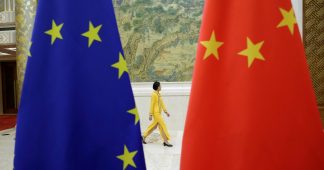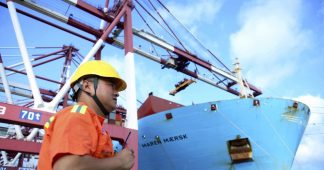19 Février 2020
L’évolution du capitalisme mondialisé a étendu à la planète entière le processus de baisse tendancielle des taux de profits ce qui génère désormais une crise globale du système qui est poussé vers la fuite en avant dans des guerres sans fin, des opérations de fragmentations et de contrôle des sociétés avec l’instauration de ce que l’auteur ci-joint a décrit dans ses nombreux travaux comme « le fascisme digital » qui menace toute l’humanité. Face à cela, l’école cybernéticienne soviétique dont elle est le produit a développé et continue à travailler en Russie sur le développement d’un modèle de planification digitale démocratisé. Ce modèle avait été refusé par la bureaucratie centrale soviétique à l’époque du socialisme réel car cela aurait menacé ses positions de pouvoir. D’où la fuite de cette bureaucratie vers l’embourgeoisement et le capitalisme, et le démantèlement du socialisme. Mais le travail se poursuit dans certaines universités d’ex-URSS sur l’élaboration d’un modèle économique démocratique et scientifique devant permettre à l’humanité de dépasser le stade capitaliste actuel incapable d’assurer son épanouissement.
La Rédaction
The need for cybernetic economic planning and democracy for the survival of developing countries1
Février 2020
Par Elena Veduta*
The main points of the Davos Forum 2020 come down to the fact that the world is in a fog of geopolitical and geo-economic uncertainty.
Globalization, led after the Cold War by international economic institutions, has strengthened the economic interdependence of states. However, low GDP growth rates force some states to consider international institutions as obstacles, and not as tools to advance their interests. In addition, global coordination in the form of trade has become a high risk for the world community and, above all, because of the risk of separation of the United States and China. Creating a global Artificial intelligence takes time. Therefore, it was noted at the Davos Forum that in the face of impending turbulence in the global economy, which is intensifying due to the risk of trade and technological rivalry between the United States and China, which account for 40% of global GDP, the relevance of national sovereignty is increasing. It was stated that in the emerging new polycentric world, in which it is impossible to predict who will be the winner and the loser, the decisive role in the competition of states will belong to artificial intelligence (AI).
The material carrier of artificial intelligence is a computer. The goals of AI algorithms of its functioning are determined by the interests of the dominant social strata and knowledge.
The experience of living from the buy-sell margin obtained from trading in goods and money has been developing since ancient times. Starting from the 16th century, the historical practice of capitalism testifies to the cyclical nature of its economic policy. In a multipolar world where states compete with each other, mercantilism is used with the introduction of customs barriers. As a rule, mercantilism ends with the transition of trade wars to military action. This is the war of Napoleon, and then the First and Second World Wars. After the war, all countries, following liberalism, trade according to the rules of the new international monetary system created by Monetary Financial Institutions (MFIs). Thus, the capitalist strategy of centralizing world capital in the hands of MFIs is implemented through the cyclical nature of the economic policy “mercantilism-war-liberalism-mercantilism …” in which world wars, providing a violent way out of the global crisis, are becoming more destructive for humanity. At the same time, the technological and social inequalities of developed countries, where MFIs are mainly based, and those of developing countries, are increasing. Today, given the nuclear potential of different countries, MFIs are trying to avoid a direct military conflict with them, and are pinning their hopes on strengthening their power by creating a global digital people management based on the use of artificial intelligence.
In order for AI to serve to increase the efficiency of economic management, its software should be based on a cybernetic model of economic planning in the direction of the growth of the public good, which ensures the coordination of orders of end consumers taking into account the capabilities of manufacturers. The construction of such a model depends on the knowledge of economic cybernetics – the science of managing information processes in the economy. However, the Western “thought factories” that serve to strengthen the power of MFIs are characterized by a complete lack of ideas for overcoming the global crisis. The digitalization of the economy is based on the familiar “buy-sell” ideology and total control over people with the manipulation of consciousness.
Digitizing chaos with the help of “Big data” – an unsystematic flow of information using predictive econometric models, it is naively believed that AI will be created by trial and error or “inventing”, which can lead the economy from imbalance to equilibrium, to a new era of globalization. On the other hand, realizing that there will be many dissatisfied with worsening lives and rising unemployment due to the introduction of robots, MFIs are trying to solve these problems by promoting the creation of AI for tracking people, recognizing people, etc … It got to the point that the goal of developing this AI is to manage people based on DNA.
The pioneers in establishing digital people management are China and India. Such use of digital technologies to suppress dissent and protests means recognition of the inefficiency of managing the state’s economy and the inevitability of further immersion of these countries in crisis. It is significant that sellers of such technologies (Israel, Italy, USA, etc.), not always living in such digital countries, sell espionage and information gathering software worldwide, including Angola, Bahrain, Kazakhstan, Mozambique, Nicaragua and Saudi Arabia. If developing country governments are not interested in building production chains for the growth of the public good, then ultimately their people will be embedded in the “non-dormant” global AI as second-class people serving the global digital leadership of the West and enriching MFIs for.
However, the Western “thought factories” that serve to strengthen the power of MFIs are characterized by a complete lack of ideas for overcoming the global crisis. The digitalization of the economy is based on the familiar “buy-sell” ideology and total control over people with the manipulation of consciousness.
At the same time, Western countries are striving to create an AI that will comply with the principles of democracy, ensuring the right balance between security and respect for privacy and human rights. If you follow the principles of democracy, you need digital economic planning to improve people’s lives. And here the West, striving to preserve the right of its people to comprehend life, create, and, most importantly, engage in science to improve the lives of the masses during the creation of AI, can get a strategic advantage over developing countries. Universal voting in elections is good, but practice shows that it is not a sufficient attribute of democracy, because until the moment of voting, the consciousness of the masses is often manipulated and those who later come to power do not fulfill election promises. Therefore, questions arise to the principles of the formation of representative bodies.
In the USSR, representatives of the labor collective participated in the work of the soviets on the job. And this was correct, since the deputy must remain with the team that nominated him in order to reliably reflect his aspirations. Moreover, remaining at his workplace, the deputy has the opportunity to grow professionally. To this, in my opinion, one should add the establishment by the parliament of the dynamics of the government’s salary depending on the growth of social labor productivity and the easy recall of the deputy who has lost the confidence of voters. In summary, democracy is an economy that ensures the growth of the public good, responsible freedom of speech and elections to bodies of representative power, whose activities are controlled from below by labor collectives, in the interests of the people.
Former USSR and the challenge of creating a new and democratic scientifically planned economy
Today, an economic cyber system, as an alternative AI that ensures the growth of the public good, can be created only by Russia together with other countries – former republics of the USSR, striving for national sovereignty. This is due to the fact that these countries have unique experience in managing the economy, based on live input-output planning, which takes into account feedback, and knowledge of economic cybernetics, generalizing their experience to improve planning.
The USSR, which chose the course of industrialization at the end of the 20s of the last century, created a fundamentally new management mechanism based on living economic planning. It was a process of iteratively coordinating planned “input- output” calculations of different management levels to ensure priority development of key industries. Thanks to the created mobilization model, the USSR was able to quickly rebuild the economy on a war footing and win the Second World War, quickly restore its economy and achieve military parity with the United States by the middle of the 20th century. A new era of competition between two superpowers, the USSR and the USA, began, personifying the confrontation of alternative strategies for constructing the future: in the direction of key industry priorities, and the strategy of redistributing the generated income of assets in favor of MFIs.
Even then, in the 50s, a reorientation of the development of the Soviet economy to the growth of the public good was required. In addition, in the context of the growth of social production and the complexity of already then, in the 1950s, in addition, with the growth of social production and the complexity of production relationships, the calculation of the plan became more and more laborious. A new planning model should be presented in the form of a system of mathematical algorithms for using the latest advances in computer technology. The organization of information flows in accordance with the requirements of the model and the calculations based on it of the effective distribution of production investments would mean the creation of AI for the effective management of the economy, which would have ensure the USSR’s gain in the Cold War, and today the world would be completely different.
However, due to the lack of planning experience, which was then only a little over 20 years old, economic knowledge to automate the management of the economy and democratic principles of leadership in the country, voluntarism began to develop, which destroyed the USSR.
The authorities perceived economic cybernetics as invading their right to rule the state. If then technical cybernetics received state support, then the status of economic cybernetics as a state doctrine was blocked in the mid-20th century by the vicious doctrine of commodity production under socialism, according to which profit became the criterion for managing enterprises. Despite this, the Soviet cybernetics scientist Nikolai Veduta developed a dynamic model of intersectoral balance, presented in the form of a system of algorithms for coordinating planned input-output calculations, taking into account feedback, and including a control parameter – production investment.
The subsequent voluntarist reforms aimed at increasing the financial resources remaining at the disposal of enterprises, ministries and republics intensified the chaos in management and, ultimately, led to the collapse of the USSR and the State Planning Commission in 1991, and the handover of the country’s economy to global financial management, which turned us into a raw materials appendage. Today, Russia, like all developing countries, faces a much more sinister threat – to submit to the emerging global digital governance, using a “non-dormant” AI with the destruction of its history.
The problems of the former USSR in creating AI for economic planning have already become problems of global governance, which have neither the experience of living planning of the USSR, nor the knowledge of economic cybernetics. Today it is very difficult to restore the manageability of the economy. Supercomputers, new information technologies have been created, but there is no economic knowledge for cybernetic planning (automation) of the economy. MFIs and the bureaucracy have done everything to teach economic theories in universities that replace economic science. It has become convenient for bureaucracies to introduce digital technologies in the service sector in order to separate themselves from people through robots. Digitalization of chaos only dooms the world to the loss of rapidly decreasing time with the subsequent « end of history ». Why waste time on digitalizing human behavior when an economic disaster is coming? And everything will fly to tartarars, with all the monitoring and controllers … Is it not time for MFIs to seriously manage the economy so as not to miss the time when it will be too late for and for them?
However, there is a huge positive, at least in former Soviet countries. The public self-consciousness of people wishing « to return to the USSR » with the understanding that a bright future can be built has ripened. It is impossible to return to the USSR, but to return to solving problems that arose as far back as the 1950s – to creating cybernetic economic planning and triumphing the principles of democracy is not only possible, but vital for it. And here, political will alone is not enough. It requires economic knowledge that is stored and developed only in the countries-former republics of the USSR. I am sure that a healthy survival instinct will help our state to realize a new path for the benefit of humankind. This is the historical mission of the Community of independent states-former republics of the USSR.
* Professeur d’économie, cybernéticienne, Université Lomonosov, Moscou, Russie.
Published at www.lapenseelibre.org











